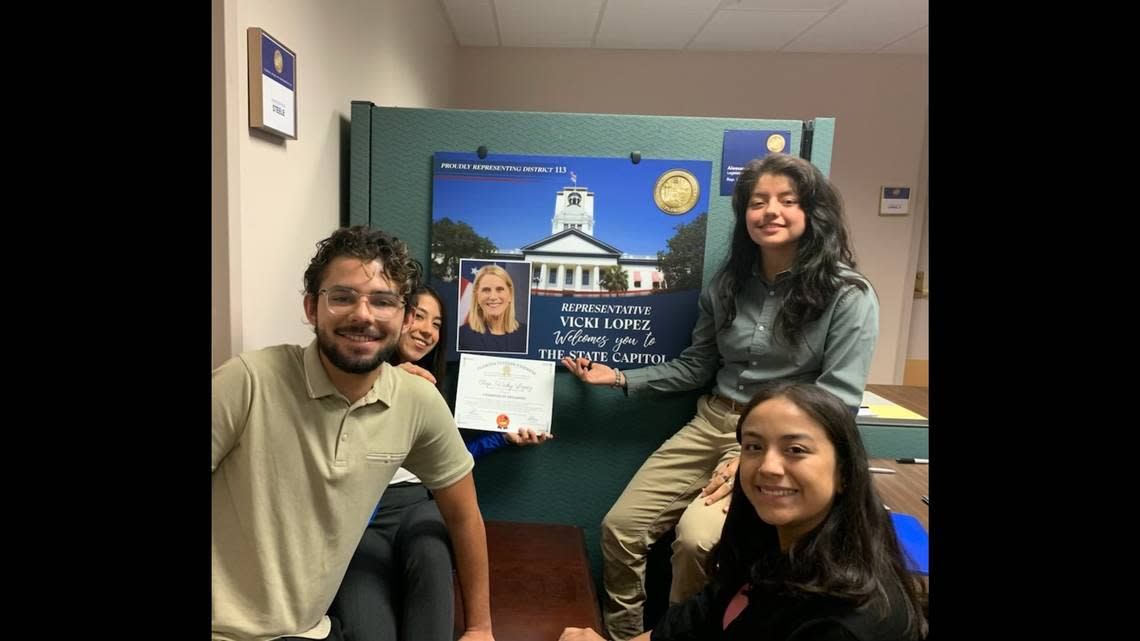Dreamers may not be able to vote, but they convinced GOP lawmakers to aid their cause

- Oops!Something went wrong.Please try again later.
They attended Florida public schools and grew up undocumented in different pockets of the state after being brought to the country by their parents as children.
For nine weeks in a row, dozens of these young undocumented immigrants known as Dreamers, traveled to Tallahassee to meet with Florida lawmakers. Every week, they traveled hours by car, from cities like Miami and Orlando, to urge legislators to protect a 2014 law that has allowed them to pay in-state tuition at state colleges and universities.
Their goal was to share their stories with lawmakers — mostly Republicans — to convince them to counter an effort led by Gov. Ron DeSantis, who earlier this year sought to repeal the law, saying the state should not “subsidize” the education of non-U.S. citizens.
“When I spoke to legislators, I explained how us Dreamers are really just trying to better ourselves, contribute to the communities we grew up in and achieve our American dream,” said Murilo Alves, 25, who came to the United States from Brazil when he was 3.
The effort worked — at least for now.
READ MORE: Florida Legislature goes big for DeSantis — with record spending — and then goes home
Florida lawmakers concluded the 60-day legislative session on Friday without repealing the in-state tuition law. House Speaker Paul Renner and Senate President Kathleen Passidomo said the decision to protect the in-state tuition waiver, while also pursuing other immigration initiatives backed by DeSantis, was a “balanced” and “fair” approach to dealing with the issue of illegal immigration.
“I am comfortable with where we landed,” Renner said. “I think it is a fair place to land, it is tough on immigration and also fair to the students.”
Dreamers lead effort to protect in-state tuition law
Several Dreamers who came to Tallahassee and Republican lawmakers who backed their efforts are hopeful that the results of this session will have long-term impact.
DeSantis, who has more than three years remaining in his second term, has embraced hard-line immigration policies and is using his legislative agenda as a political springboard into the race for the GOP presidential nomination. He is expected to announce a run for president in the coming days.
“Although we stopped it this year, I feel like I have to continue to fight the battle to make sure it doesn’t happen next year and the years that follow,” state Rep. Vicki Lopez, a Miami Republican, told the Herald/Times Friday.
Among Republican lawmakers, there was a mix of vocal and quiet opposition to repealing the in-state tuition waiver, Lopez said. The Miami-Dade delegation was key in fighting it, she added.
The law is part of the legacy of DeSantis’ own lieutenant governor, Jeanette Nuñez, who championed the policy in 2014 when she served in the Florida House. That dynamic added another reason for some Republicans to oppose the repeal effort.
But Lopez said the Dreamers were instrumental in defeating the proposal.
“You could talk with them about their lives and how hopeful they were with seeking a higher education and what their dreams were for themselves and their families. Once you humanize an issue it is hard to not see it through their perspective,” Lopez said.
Fighting until the end of session
On the last day of the legislative session, four Dreamers were still roaming the hallways of the Capitol. Mostly, they were hand-delivering tokens of appreciation to the lawmakers who helped their cause.
Britney Ortiz, a 20-year-old Orlando student who is poised to graduate from Valencia State College on Sunday, said she traveled to Tallahassee every single week during the legislative session. She met with dozens of lawmakers. She came to the United States at the age of 3.
“I learned about the power that our voices hold,” Ortiz said. “Since we can’t vote, sometimes it is hard to get our voices heard. But we can’t be hiding, we have to speak up.”
Aquiles Barreto, a 21-year-old studying communications at Florida International University, said it was so important for him to come to Tallahassee that one week he took an online midterm exam for one of his college courses on the drive back to Miami.
Barreto, who came to the country from Venezuela at the age of 11, said he decided to study broadcast journalism because he values the freedom of the press, more so after seeing those rights restricted in Venezuela.
Bela Morcas, a 21-year-old who came to the United States from Colombia at the age of 13, is a year away from graduating as a psychology major from FIU. When she learned about the in-state tuition law as a high school senior, she said it was “the biggest blessing.”
While she was lobbying lawmakers, she worried that she would have to stop studying for a while if in-state tuition was repealed.
Morcas is not sure that their effort will be effective long-term, but she said she is proud that she and dozens of other Dreamers were able to put “nuestro granito de arena” — “our grain of sand” — meaning we made our contribution.
Maria Tinoco, a 24-year-old Dreamer who last week graduated as a mechanical engineer from FIU, said the fight is not over.
“Although we were successful,” she said, “there is still a lot of work to be done.”

